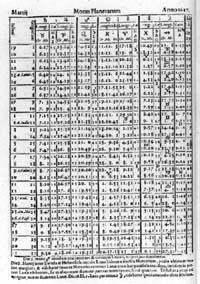Kepler and Calendar Reform
 Table from Kepler's
Ephemerides.
Table from Kepler's
Ephemerides.
Image by kind permission of the Master and Fellows of Trinity College Cambridge.
In 1613, the Emperor Matthias asked Kepler to attend the Reichstag at Regensburg to counsel on the issue of adopting the Gregorian calendar reform in Germany. In Germany, the Protestant princes had refused to accept the calendar on confessional grounds. Kepler believed that the new calendar was sufficiently exact to satisfy all needs for many centuries. He firmly believed that the fears of the Protestant princes were unfounded and that for commerce, public fairs and court days, it was imperative that a common kind of time regulation was adopted throughout the German speaking lands. Thus, he proposed that the Emperor issue a general imperial decree to implement the calendar. It was not until 1700, however, that the Protestant princes in Germany accepted the new calendar. In the On the True Year (1614), Kepler established that Christ was born fully five years earlier than had traditionally been assumed.